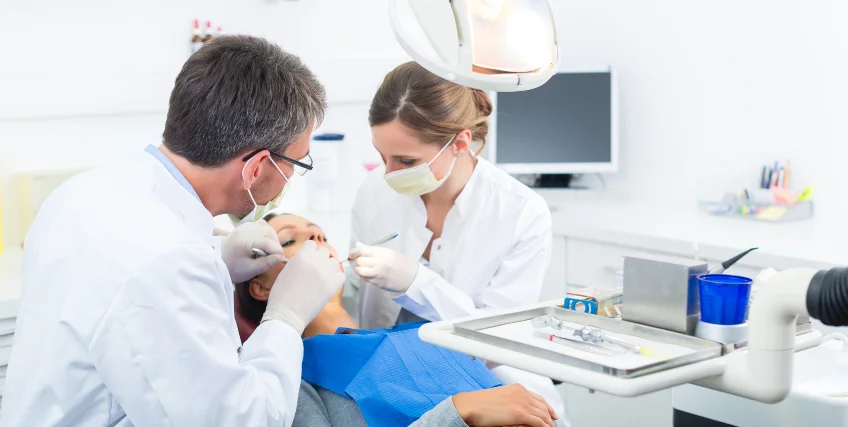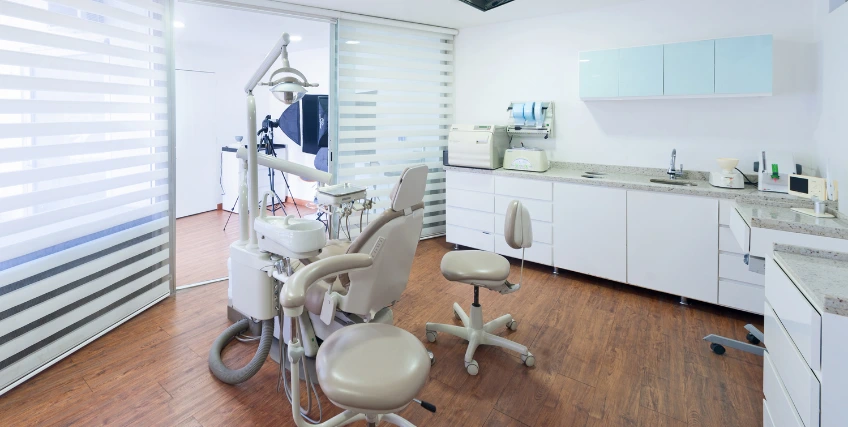Are Low-Interest Rates Always Better for Dental Practice Financing?
February 17, 2025 | Last Updated on: February 17, 2025

Starting or acquiring a dental practice requires a significant financial investment. Whether you are a recent graduate looking to open your first clinic or an experienced dentist aiming to expand or go out independently, securing the right financing is essential. A loan for a dental practice can help cover expenses such as purchasing equipment, acquiring an existing practice, hiring staff, and marketing your services. In this guide, we will explore the different types of loans available, the documentation required for applications, and alternative financing options for dental professionals to secure the necessary funds.
Buying an Existing Dental Practice vs. Starting a New Practice
Before applying for a dental business loan, one of the first decisions you’ll need to make is whether to buy an existing dental practice or launch a startup from scratch. Each option has its own advantages and challenges.
Buying an Existing Dental Practice
- Established Patient Base: One of the biggest advantages is that you inherit an existing clientele, ensuring immediate revenue. The office will also be connected with various dental insurance programs, which can also provide ongoing referrals and payments.
- Existing Equipment & Staff: The practice is already equipped with dental chairs, X-ray machines, and trained staff, reducing setup time. This also saves you from having to find and hire staff, establish office procedures, and set up payroll.
- Proven Business Model: The financial history of the practice provides insights into profitability, making it easier to secure a loan for dental practice.
- Higher Initial Cost: While you save on setup time, purchasing an established practice requires a higher upfront investment. Although you'll pay more, the immediate revenue should quickly cover those costs.
Starting a New Dental Practice
- More Control: You have complete control over the location, branding, equipment, and services offered. Existing practices in your target location may be too expensive or have higher overhead costs that can reduce expected profits.
- Lower Initial Cost: Although you need to buy everything from scratch, initial costs can be managed by phasing purchases over time. Many small business owners buy used equipment when starting out, then upgrade or replace as needed or as your income allows.
- Longer Growth Period: It takes time to attract new patients and become profitable, making financial planning crucial. Signing contracts with insurance carriers can lead to referrals that can grow your business faster than word-of-mouth or traditional advertising.
- Financing Challenges: Since there’s no proven financial history, lenders may be more cautious about approving a loan for dental practice. You may need to rely on personal loans, credit cards, and your home equity until you can establish stable cash flow from your dental office.
How Much Can You Expect to Earn?
A dental practice can be highly profitable, but earnings depend on various factors, including location, patient volume, and specialization.
Average Income
- General Dentist: Annual average income of $194,400. However, actual incomes vary by state.
- Specialists (Orthodontists, Endodontists, Oral Surgeons): Can earn between $200,000 and $500,000 annually.
Factors Affecting Earnings
- Location: Urban areas with high competition may have lower per-patient revenue but higher volume.
- Type of Services: Cosmetic and specialized procedures yield higher profits.
- Insurance & Payment Structure: Practices accepting private insurance or offering in-house financing can impact revenue.
Equipment and Expenses for a Dental Practice
Setting up a professional dental practice involves significant investment in equipment and operational expenses. Dental office loans can help you purchase this equipment with a lump sum of money, or you can pursue a lease or equipment loan for each piece of equipment for your office.
Essential Equipment
- Dental Chairs & Units: The backbone of your practice, costs can range from $5,000 to $15,000 per chair.
- X-ray Machines & Imaging Equipment: Critical for diagnostics, costing between $10,000 and $50,000 or mo
- Sterilization Equipment: Ensures hygiene and safety, typically priced at $2,000 to $10,000 and higher.
- Dental Handpieces & Tools: Drills, probes, and hand instruments can collectively cost $5,000 to $20,0
- Computer & Practice Management Software: Essential for scheduling, billing, and patient records, costing around $5,000 to $20,000. Some services are sold as monthly subscriptions, which typically cost between $100 and $500 per month.
Operating Expenses
- Office Rent & Utilities: Location and size impact rent costs, typically dentists pay between 6% to 9% of their income in rent, with an average between $2,000 to $10,000 per month.
- Staff Salaries: Dentists, hygienists, receptionists, and assistants can cost $100,000+ per year, depending on the size of your staff and how many hours they work.
- Marketing & Advertising: Website, social media, and local ads may require $5,000 to $20,000 annually.
- Insurance: Liability, malpractice, and property insurance can cost $3,500 to $15,000 per year or more based on the size of your practice, deductibles, exclusions, and your claims history.
Types of Loans Available for Dental Practices
Traditional Bank Loans
Traditional banks offer some of the most reliable options for obtaining a loan for dental practice. These loans typically come with competitive interest rates and favorable repayment terms. However, banks have strict lending requirements, including high credit scores, detailed business plans, and financial statements. If you have an established credit history and can demonstrate strong financial stability, a traditional bank loan may be the best option for your dental practice.
Small Business Administration (SBA) Loans
The U.S. Small Business Administration (SBA) offers loan programs that cater to dental professionals. The most common SBA loan for a dental practice is the SBA 7(a) loan, which provides up to $5 million in funding to startup your business, buy an existing practice, or to use as working capital. These loans come with lower down payments and extended repayment terms, making them an attractive choice for new dentists or used as dental practice acquisition loans.
Additionally, the SBA 504 loan is an option for purchasing real estate or expensive dental equipment. Although SBA loans require a lengthy approval process and substantial paperwork, they offer lower interest rates and government-backed security.
Online Lenders
For dentists who need quick access to capital, online lenders provide a viable solution. Online loans for dental practice financing typically have a streamlined application process and fast approval times, often within a few days. However, they tend to have higher interest rates and shorter repayment periods compared to traditional banks. If you need a smaller loan for dental practice to cover short-term expenses, an online lender might be a good option.
Equipment Financing Loans
Dental equipment is a significant investment, and equipment financing allows you to purchase essential tools without depleting your cash reserves. This type of loan is secured by the equipment itself, making it easier to qualify. Equipment financing is an excellent way to acquire state-of-the-art dental technology without the burden of high upfront costs.
Business Line of Credit
A business line of credit provides flexible financing for dental practitioners who need ongoing access to capital. Unlike traditional loans, where you receive a lump sum, a line of credit allows you to withdraw funds as needed. Interest is only paid on the amount used, making it a great option for managing cash flow, covering payroll, or funding unexpected expenses.
Required Documents for a Loan Application
When applying for a loan for dental practice, lenders require various documents to assess your financial health and ability to repay the loan. Commonly requested documents include:
- Personal and Business Credit Scores: Lenders review your credit history to determine your reliability. Before applying, take simple steps to boost your credit score, like paying off credit cards and disputing any errors.
- Business Plan: A well-detailed business plan that outlines your financial projections, marketing strategy, and operational goals.
- Tax Returns: Personal and business tax returns from the past three years.
- Financial Statements: Profit and loss statements, balance sheets, and cash flow statements. Lenders typically ask for the last two to three months of bank statements to support your financial statements.
- Loan Purpose Statement: A clear explanation of why you need the loan and how you plan to use the funds.
- Collateral Documentation: If applying for a secured loan, you must provide information about the assets being used as collateral.
Alternative Financing Options
If traditional lending options are not suitable, alternative financing methods can help secure a loan for dental practice. Here are some additional ways to finance your business:
Cash-Out Refinance
If you own property, a cash-out refinance allows you to tap into your home’s equity to secure funds. This option provides a lower interest rate compared to other financing methods but carries the risk of losing your property if you default.
Home Equity Loan or Line of Credit (HELOC)
A home equity loan or HELOC enables you to borrow against the equity in your home. This financing option offers lower interest rates and long repayment periods, making it an attractive alternative for funding a dental practice.
Credit Cards
Business credit cards can be used for short-term financing needs such as purchasing supplies or covering minor expenses. While credit cards provide immediate access to funds, they come with high-interest rates, making them less ideal for large investments.
401(k) Loan
If you have a retirement savings account, you may be able to borrow against it to fund your dental practice. A 401(k) loan provides quick access to funds without a credit check, but it comes with risks, such as penalties for non-repayment and potential losses in retirement savings growth.
Personal Loans
A personal loan is an option for dentists who may not qualify for business loans. These loans are based on personal credit and income rather than business revenue. While interest rates may be higher, they provide an alternative for those struggling to secure traditional business financing.
The Bottom Line About Getting a Loan for a Dental Practice
Securing a loan for a dental practice is an essential step in launching or expanding your career in dentistry. Whether you choose a traditional bank loan, an SBA loan, or an alternative financing option, careful planning and financial preparation are crucial. By understanding the different loan types, required documents, and alternative funding methods, you can make informed decisions to achieve your professional goals. Be sure to explore multiple lenders and compare offers to find the best financing solution for your needs.
Frequently Asked Questions (FAQs)
How Much Can I Borrow for a Dental Practice Loan?
The amount of a loan for a dental practice can vary based on the lender and the borrowers’ financial profile. SBA loans can go up to $5 million, while traditional bank loans and online lenders may offer anywhere from $50,000 to several million dollars.
How Long Does it Take to Get Approved for a Dental Practice Loan?
Approval times vary by lender when getting a loan for a dental practice.
Can I Get a Loan for a Dental Practice With Bad Credit?
Yes, but your options may be limited. Online lenders, personal loans, and alternative financing methods such as a cash-out refinance or 401(k) loan may be more accessible for those with lower credit scores or a bad credit history.
What is the Typical Interest Rate for a Loan for a Dental Practice?
Interest rates on a loan for a dental practice depend on the type of loan and lender. Traditional bank loans and SBA loans generally have lower interest rates (5-10%), while online lenders and credit cards may have rates exceeding 20%.
What Credit Score Do You Need For Dental Practice Financing?
Credit score requirements vary by lender, and your approval odds increase with a better credit score. Additionally, you may qualify for lower interest rates and better loan terms as your score improves. Some lenders may approve borrowers with credit scores as low as 580.




